
I often wondered why Jill Leibman Kornmehl, a key contributor to this blog, got so involved with researching her husband’s family, the Kornmehls–rather than, say, her own family. Today I present the answer, in Jill’s words. It’s a story filled with miracles, large and small.
An Inspiring Woman
by Jill Leibman Kornmehl
It was not the most opportune time to have a conversation about her family with my mother-in-law, but I felt I had no choice. Frances was in the late stages of stomach cancer and I was six months pregnant. I wanted to name my unborn child after one of Frances’ nieces or nephews who had perished in the Holocaust. I needed to know their names.
I had come into the family in 1985. It was now six years later. As a daughter-in-law, I found it difficult to ask her in detail about her family history. Only when we found out that Frances was dying did I get brave enough to broach the subject.
She didn’t have the names of the nieces and nephews, and was only able to provide very sketchy family information. There were many gaps I wanted to fill.
After she died, that is exactly what I did.
A Tale of Survival
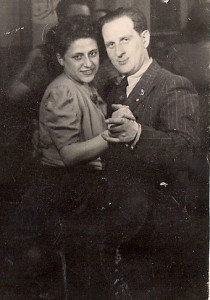
Frances was born in Tarnow, Poland, in 1925, a beloved change-of-life baby – her eldest brother, Moshe, was 18 years older than she was — and the youngest of five children in a close-knit Chassidic home. Besides Moshe, her other siblings were Fay, Rifka, and Naftali.
The men were both in the clothing business; Moshe owned a well-known shirt business on Tarnow’s main street and was married. Naftali was single and lived at home.
In 1941, war broke out and Tarnow was liquidated. Frances found herself alone at the age of 16. Naftali had gone out and “disappeared” one day–he was likely rounded up–and Frances had no clue what happened to him.
Francis was sent to the Kraków-Płaszów concentration camp. She stayed there until she was transferred to Auschwitz in 1944 . On her first day there, Dr. Josef Mengele selected Frances for the gas chambers. The doors closed… she waited to die…and then the doors suddenly opened again. The order had come through for 300 girls to be sent to a work camp in Sudetenland, the German-speaking region of what is now the Czech Republic. Frances had a number tattooed on her arm, which she always claimed was a good thing. “Without this I would not be alive,” she would say, meaning that only those destined for work, rather than death, got tattoos.
The girls were transferred three weeks later. And one day in 1945, they awoke to find the guards gone. The word spread: They had been liberated.
Frances made the long trip back to Tarnow, where she was told that all the members of her family had died. She didn’t give up hope. She took a job and waited, but no one came back. Except a distant cousin named Nathan Kornmehl.
Love in the Ruins
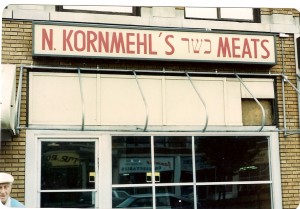 Nathan had met Frances early in the war. Forced to leave Germany in the 1930s, Nathan’s family had moved back to their hometown, Tarnow, where they lived in a building owned by Frances’ older brother, Moshe. When Nathan returned to Tarnow after the war, he saw Frances again. He found her still beautiful, in spite of all she had been through.
Nathan had met Frances early in the war. Forced to leave Germany in the 1930s, Nathan’s family had moved back to their hometown, Tarnow, where they lived in a building owned by Frances’ older brother, Moshe. When Nathan returned to Tarnow after the war, he saw Frances again. He found her still beautiful, in spite of all she had been through.
They married and moved to America. Frances, who came from a religious home, insisted that Nathan not work on Shabbat. They settled in Buffalo, where Nathan had a sister, and voila — Kornmehl’s Kosher Meats was born.
Frances and Nathan had five children, including my husband, Bernie.
It was a privilege to know Frances. She was a wonderful, devoted mother, a model of kindness. She always gave to charity, even when she herself had very little. She was a great listener and loved to be around her family. And, as Nathan said, she always looked beautiful.
The Search Begins
In 1991, there were very few resources available to trace Holocaust victims. I started out by sending the names of Frances’ brother, Moshe Leder, and her sisters, Fay and Rivka, to the International Tracing Service (ITS) in Bad Arolsen, Germany, at that time operated by the International Committee of the Red Cross (ICRC); they had records of most of the concentration camps in Europe. A few months after I sent out an inquiry, an envelope arrived from Germany with information about Moshe, making us one of the first families to successfully trace a relative through the ICRC. They provided a death certificate from Mauthausen concentration camp for him.
Then I wrote to Tarnow. The initial search by the director of archives of the town’s marriage records revealed no information about marriages for Fay or Rivka. This was not unexpected. Most religious Jews did not have civil marriages that would be listed in town records. I suggested she try birth records. She located several Leders with the same dates of birth but with somewhat different names – Feiga and Ester Ryfka Leder.
Bingo!
Sadly, although we had their names, their fates remain a mystery.
Frances’ Journey
The last piece of the genealogy puzzle — or so I thought — was tracing Frances’ journey from Tarnow to Krakow-Plaszow to Auschwitz.
Frances had told me that she was called Freyda at home and Frances at her secular secondary school. I sent both of those names to the ICRC, which had the Auschwitz records, but there was no record under either name. That had to be wrong. We knew she had been in Auschwitz. A few years later, I tried submitting the information to the ICRC again. This time they contacted me with a question. Their records found a Frania Leder with the identical date of birth and parents’ names. Could they be the same person? Only then did it become apparent that my mother-in- law, once known as Frania Leder, had become Frances Leder when she left Europe to start a new life.
To life, To Life – L’Chaim!
In 1994, I had not yet been able to find out the names of Frances’ niece and nephews, so we gave our youngest son, David, the Hebrew name “Chaim,” which means life. It was a way to honor the lives of family members who had perished, to show that Frances’ family lived on.
Nearly ten years later, we heard from Tarnow:
What a surprise – call it a small miracle. It turned out we had honored Frances’ niece and nephew more accurately than we knew. Frances’ nephew was named Chaim, identical to David’s Hebrew name, while her niece was Chaya (spelled Chaja here), the female version of Chaim.
To life!
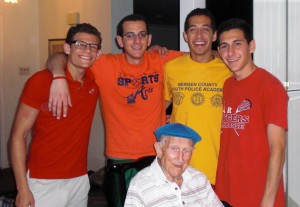

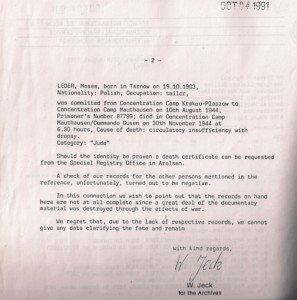
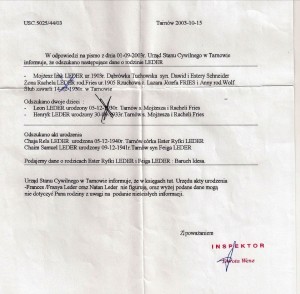
You have brought Frances alive for your readers–a wonderful woman whose greatest legacy was her love of family. Thanks!
You’re welcome. Frances had a very moving story and I’m glad to be able to share it with more people.
Frances was indeed an inspiring woman. Thank you for sharing her moving story, as well as the story of learning about her.
The resilience of the human spirit always amazes me — as you know better than most, having written about Viktor Frankel.
What an amazing outcome! Thanks for sharing Frances’ story.
You’re welcome. Thanks for coming by!
Frances Kornmehl was a selfless woman who was a wonderful wife and an exceptional mother. As her oldest child, I learned many fine qualities from her which I passed on to my only child, our son Brett. When I think of my mom, which is often, I recall a very affectionate, beautiful woman both inside and out. Thanks for highlighting her life in your blog.
There are so many people in the family I regret not having met — mostly because I didn’t know about them! I had relatives through my ex-husband’s family in Buffalo and we were there fairly often.
I was glad to be able to highlight your mother and glad that it gave you pleasure.
Nice to see another Edie on this blog, by the way!
How touching! I feel like I just met Frances. So glad that her story was shared.
A living archive a remarkable survivor: Frances Leder Kornmehl (from Tarnow)
(b. 1924) (The interview was made in 1989, so Frances was 65 years old)
https://collections.ushmm.org/search/catalog/irn511796
Frances (called Freyda, the Yiddish name, at home) Kornmehl –
married Nathan Kormehl (below, interview).
In the 1930s, Nathan and family had returned to Tarnow, his family’s roots…and they had met there…
Nathan Kornmehl (He was born in Germany. 1923)
Polish parents (they had relatives in Krakow – not so far from Tarnow, besides – those in Tarnow, many came from Krakow…so may well be related)d
https://collections.ushmm.org/search/catalog/irn511797